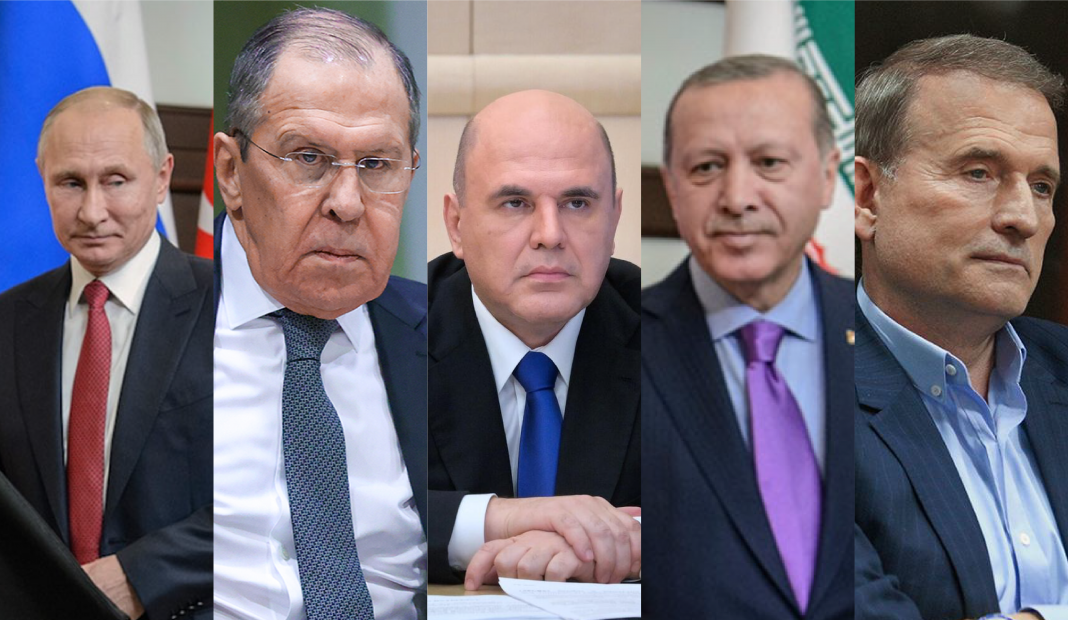This report describes the key events that had an important impact on the political, economic and social processes inside Russia.
Based on the results of the past week, the following key events can be brought to attention:
- Public militarisation is growing noticeably in Russia. Regardless of the further development of the situation in Ukraine, the Kremlin is preparing for possible new flashpoints along Russia’s borders. The active discussion of the deployment of air defence systems in the centre of Moscow and the Moscow region is an attempt to strengthen the image of an external enemy rather than a real threat of strikes against the Russian capital. At the same time, the possibility of carrying out a series of provocations that could lead to using more powerful weapons by Russia (excluding nuclear weapons) should not be discarded.
- Moscow is trying to implement a systematic geopolitical turn towards Asia and the Middle East. Putin is paying more and more attention to attempts to resolve local conflicts. Russian-Turkish cooperation is also noticeably increasing: against the backdrop of the upcoming presidential elections, Erdogan demonstrates dependence on Russia and is ready to make concessions on the Syrian issue. Also, the subject of a tripartite alliance between Russia, Kazakhstan and Uzbekistan remains on the agenda. At the same time, against the background of the worsening crisis in Uzbekistan, this project is also experiencing difficulties with implementation.
- Putin demonstrates a new strategy in the Ukrainian issue. After the leadership change of the so-called “SMO”, the tactics on the battlefield are changing in the political area. They are trying to return to the arena of “Ukrainian politicians” who fled to Russia, who, in the near future, may try to form a quasi-government and play on the moods of some areas of Ukraine. At the same time, Russia’s diplomatic pressure on the West has intensified, up to the threat of using nuclear weapons.
During January 16th–22nd, the following topics were the most relevant for Russia:
1. Telephone conversations between Vladimir Putin and Turkish President Recep Tayyip Erdogan and Iranian President Ebrahim Raisi
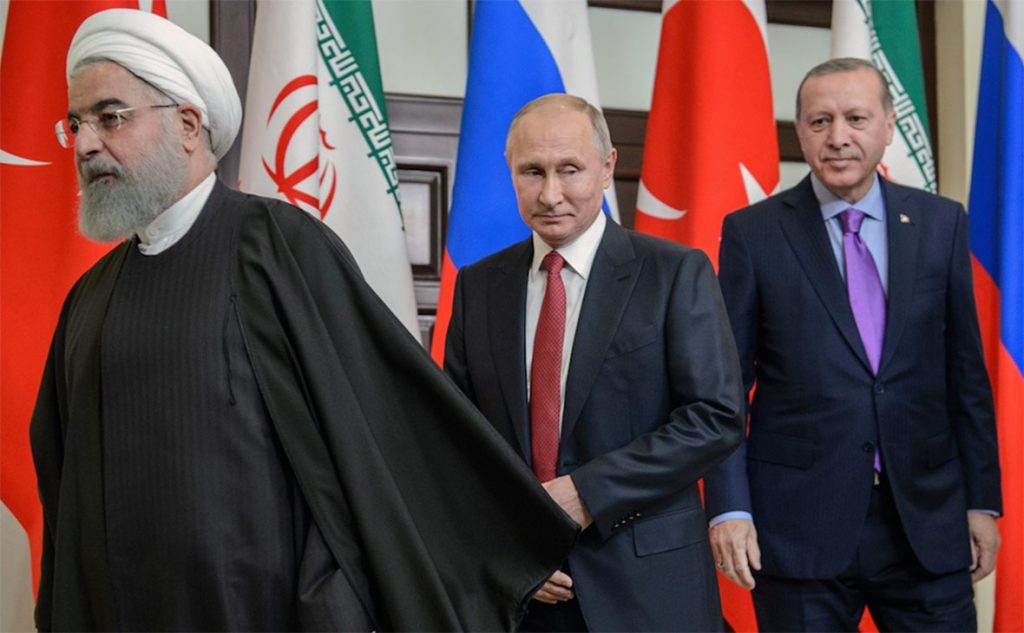
On Monday, January 16, Vladimir Putin had telephone conversations with Recep Tayyip Erdogan, and on Thursday, January 19, he spoke with Iranian President Ebrahim Raisi. Both talks touched on one common topic: resolving the situation in Syria. Also, all parties noted the importance of continuing close coordination within the framework of the Astana process as a key mechanism for promoting the Syrian settlement.
Outcomes and outlook:
Recently, more and more attention has been paid to the issue of settling the Syrian conflict. After the launch of the Astana process in 2017, all three countries acted as guarantors of a peaceful settlement of the situation in Syria (Russia, Turkey, and Iran) and encountered a conflict of interests based on the interweaving of strategically important areas for each of the parties.
In July 2022, Tehran hosted a trilateral summit in the Astana format. For Putin, this was the first foreign visit (outside the post-Soviet space) since the start of a full-scale invasion of Ukraine. Following the summit, the parties made a joint statement in which they noted that Russia, Iran and Turkey reject all unilateral sanctions against Damascus. The parties remain committed to the country’s sovereignty, independence, unity and territorial integrity. Furthermore, it is noted that the Syrian conflict has no military solution; it “can be resolved only in the course of a political process led and carried out by the Syrians themselves with the assistance of the UN in accordance with UN SCR 2254.” At the same time, the presidents intend to continue the elimination of terrorists in Syria.
Also, in Tehran, agreements were reached on holding the next summit, which was to be held in Moscow before the end of 2022. Already in November 2022, Turkey launched a series of air strikes on the territory of Syria and also announced the launch of the “Claw-Sword” ground military operation to clean up the northern regions of Syria from Kurdish terrorists, whom it accused of carrying out a terrorist attack in Istanbul on November 13. On April 17, Turkey launched a military operation in Iraqi Kurdistan (Northern Iraq) called “Claw-Castle”. At the same time, Erdogan accused Putin of failing to fulfil her obligations in the region, according to which Russia must solve the problem of the terrorist threat in northern Iraq and Syria (according to the Sochi agreements of 2019).
For the second time in January (earlier calls were on January 5 and 16), Putin’s telephone conversation with Erdogan, in which the Syrian issue is mentioned, as well as a discussion of this topic with Raisi, may indicate serious progress in the process of peaceful settlement of the situation in Syria.
It is important to note that each party has common and personal interests. Apparently, such interests were actively discussed and resolved in a non-public format after the meeting in Tehran.
For Turkey, the Syrian conflict is an essential component of regional security. For many years, Erdogan has been actively promoting creating a 30-kilometre security zone along the Turkish border. Actually, for this purpose, military operations are carried out in the territories of Syria and Iraq. Moreover, Erdogan does not hide his ambitions to annex part of the territories of Northern Syria to Turkey, which is categorically opposed by Moscow and Tehran, which support President Bashar al-Assad and act as guarantors of the integrity of Syria.
For Iran in the Syrian conflict, the strategic goal is to preserve the current regime headed by Bashar al-Assad, who has been actively supported by the Iranian Revolutionary Guard Corps (IRGC) from the very beginning of the Syrian conflict (since 2011). Also, for the Iranian side, an important issue is the maximum reduction of US influence in Syria. Ebrahim Raisi has repeatedly stated that the US military is protecting Syria’s oil fields and that the US is openly stealing resources from Syria. In this case, Tehran and Moscow have more common goals, which are also to preserve the Assad regime and the territorial integrity of Syria, which is contrary to Erdogan’s intentions.
For Russia, the Syrian issue is vital regarding geopolitical and ideological goals. The turn towards Asia and the Middle East is forcing Russia to look for those tools that can be of interest to other players in this region. If Russia was the leading supplier of cheap resources for Europe and the West, then in Asia and the Middle East, almost every state can boast of such an advantage. At the same time, Russia is trying to create the image of a “peacemaker” and a guarantor of the territorial integrity or political stability of the regimes of its allied states. In this context, Syria is the most obvious example of the slogan “we do not abandon our own” for the Middle East region. Of course, it is unlikely that anyone will blame Russia for the colossal infrastructural and economic destruction during the 11 years of the war in Syria. Still, if it allows Turkey to take part in the Syrian territories or allows the Assad regime to be removed, this will be a severe image defeat for Putin personally.
The intensification of the negotiation process between Russia, Turkey and Iran may indicate that, on the eve of the presidential elections, Erdogan agreed to reduce the tension in the Syrian issue and accepted some proposals from Moscow and Tehran. Of course, it is too early to talk about a complete resolution of the situation, but shortly, we should expect the next summit in a trilateral format, which was supposed to take place before the end of 2022.
2. Article by Viktor Medvedchuk and interview by Mykola Azarov
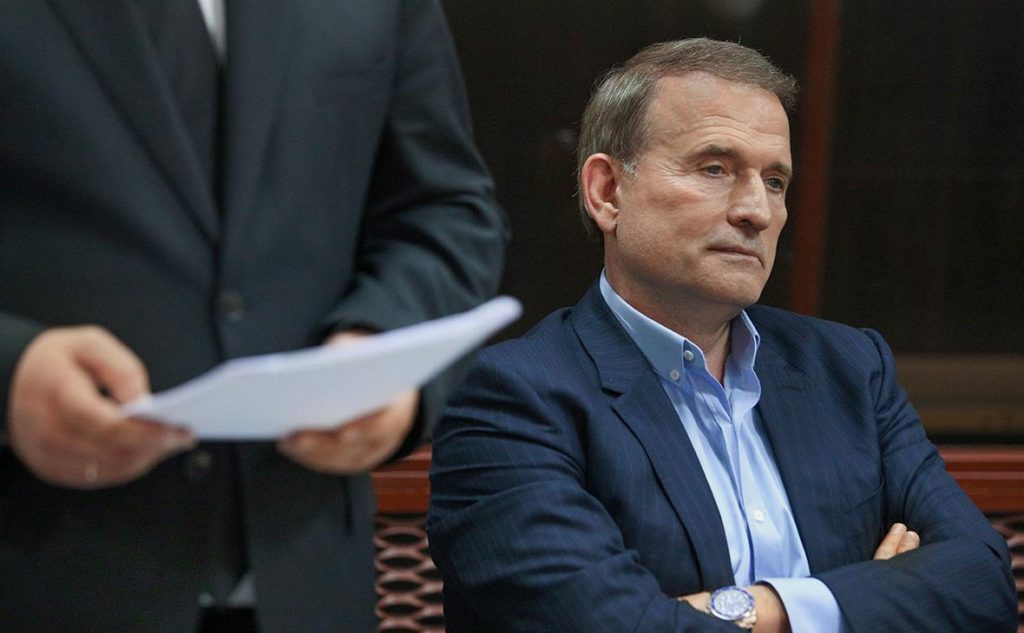
Last week, the Russian edition of Izvestiya published two articles at once related to former Ukrainian politicians who left for Moscow at different times and systematically promoted the pro-Russian ideological line. We are talking about Viktor Medvedchuk’s article “Ukrainian Syndrome. Anatomy of modern military confrontation”, published on January 16, and an interview with the former Prime Minister of Ukraine Mykola Azarov, which appeared on the website of the publication on January 18.
Key theses of the Medvedchuk’s article:
- “If billions spend on the military needs of Ukraine, then it turns out that Ukrainian interests are extremely important to the United States. But if the American army does not want to fight there, they may not be so important.”
- “The beginning of any new war usually lies at the end of the last one. The Cold War preceded the Ukrainian conflict. The answer to how it actually ended will bring us closer to understanding the meaning of the current conflict, which is not limited to Ukraine but affects many countries.”
- “In Russia, Ukraine has long been dominated by the concept of ‘another Russia’, which implies a much closer relationship than, for example, Britain and Canada. There was a popular saying in everyday life: “We have one people, but different countries.”
- “And today, more than ever, the question becomes important: Is Ukraine’s political regime a democracy?”.
- “Ukraine didn’t want to be anti-Russia for a long time. President Yushchenko, who came on the wave of the first Maidan, very quickly lost the people’s trust, mostly because of the anti-Russian policy.”
- “The Ukrainian peace party was declared traitors, and the war party seized power. The conflict went further and became international.”
- “The Ukrainian conflict will either grow further, spreading to Europe and other countries or will be localized and resolved. But how can it be resolved if the party of war reigns supreme in Ukraine, whipping up military hysteria, which has already gone beyond the country’s borders? For which reason the West stubbornly calls it democracy?
Key theses of the Azarov’s interview:
- “On the one hand, there is a legislative ban on negotiations, and on the other hand, Zelensky himself advocates holding negotiations based on the United Nations while putting forward some absolutely unrealistic 10 points.”
- “The task of NATO and the Americans is to expand this conflict as much as possible, to make it as bloody and destructive as possible.”
- “Zelensky’s relationship to Ukraine can be characterised in a few words: indifference to the country’s fate, absolute venality, incompetence in governance and indifference to the tragedy of the people.”
Outcomes and outlook:
It is clear that such publications do not appear in one of the leading Russian publications just as a result of the desire of the authors to remind themselves. Moreover, both materials are pretty scarce in terms of meanings. One gets the impression that they were written just in order to re-actualise the personalities of Viktor Medvedchuk and Mykola Azarov, presenting them to the reading public as representatives of the “other Ukraine”, friendly towards Russia. Such an actualisation of two politicians from the past is an attempt by the Kremlin to emphasise that “there are not only Nazis in Ukraine”, and there is an alternative point of view.
Another meaning repeatedly mentioned in Medvedchuk’s article is related to the return to the idea of using nuclear weapons. In fact, the article’s author, who is hardly Medvedchuk himself, gives readers a choice: either localisation of the conflict and negotiations on Moscow’s terms or a direct clash with NATO and the threat of nuclear war. Such a message is directed not only to the Western audience but also to that part of the population of Ukraine, which still sees a possible future in the fugitive politicians.
It is quite possible to assume that from now on, work will begin in Moscow on creating some “Ukrainian government”, in which Medvedchuk and Azarov will not play the last roles. Such actions and games of puppet government usually begin on the eve of decisive offensives in a war. That is, not just “talking heads” are being prepared for Ukraine, but first of all, a “new power” which should come to Ukraine in a Russian convoy.
Thus, indirectly, these articles can be assessed as Russia’s preparation for a new offensive, which involves the creation of various kinds of hybrid projects, including the “new reserve government.”
3. A session on economic matters
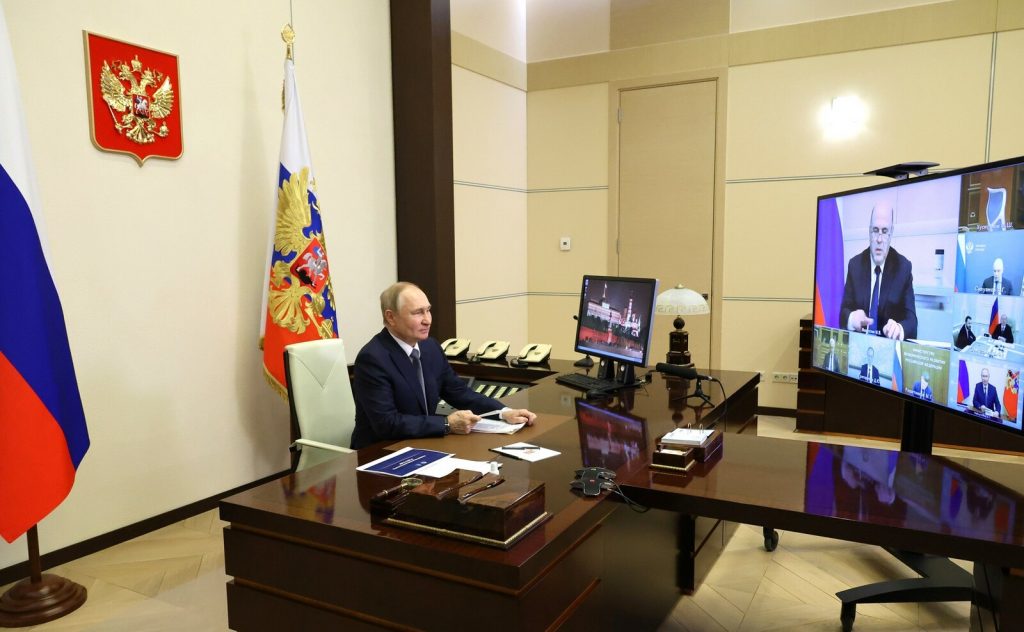
On Tuesday, January 17, Vladimir Putin held a meeting on economic issues via videoconference, which was also attended by Russian Prime Minister Mikhail Mishustin, Economic Development Minister Maxim Reshetnikov, Central Bank Chairman Elvira Nabiullina, Deputy Prime Minister Marat Khusnullin, Finance Minister Anton Siluanov and others. According to Putin, the primary purpose of the meeting was to discuss key indicators and trends in the economy, consider specific measures to address the priority development tasks, and set goals for the current year, 2023, which were previously discussed at the National Projects Council in December and the recent meeting with members of the Government.
Putin’s key theses:
- “According to the Ministry of Economic Development, colleagues will still say that the gross domestic product of Russia in January-November 2022 decreased, but only by 2.1 per cent, while they predicted for us; remember, some of our experts in the country, inside, I’m not even talking about foreign experts – ten, and 15, and even 20 per cent predicted a fall.
- “The military-industrial complex makes a significant contribution to the dynamics of the manufacturing sectors, as I have just mentioned. Over the past year, he has gained serious momentum and continues to increase capacity. Enterprises work in several shifts, some almost around the clock.
- “I would especially like to say about the oil and gas sector. Despite the already-mentioned sanctions pressure, oil production in Russia will increase by about two per cent in 2022. The volume of production amounted to 535 million tons.”
- “At the same time, natural gas production decreased: the volume decreased by 11.8 per cent. At the same time, I would like to note that, as you know, world gas prices have risen significantly due to the actions of Western countries.”
- “As a result, the federal budget deficit amounted to 3.3 trillion rubles or 2.3 per cent of GDP. We have already spoken to you, and I also said that this deficit level is one of the best indicators among the G20 countries.”
- “According to the last year’s results, it amounted to 11.9 per cent, which is less than the Central Bank and the Government had predicted. According to estimates, already in the second quarter of this year, inflation may fall below the target level of four per cent.”
Outcomes and outlook:
In fact, the meeting on economic issues, or rather its open part, is absolutely populist in nature and fully corresponds to the forecasts that Ascolta wrote about earlier: Putin is increasingly leaning towards left-wing populism, appealing to topics important to the general public – taxes, the economy, income, the lack of results from Western sanctions. Such an approach has its effect, but it does not correspond to the current situation in the Russian economy.
It can be considered very significant that the Russian media practically did not mention the statements of the participants in the meeting on the economy but only relayed Putin’s statements, most of which he has been repeating regularly since the end of 2022.
The theses voiced by Putin come down to a few ideas:
- Western sanctions are not terrible and even help develop the economy.
- The main sales markets for Russian production are outside the West.
- In the Russian economy, everything is controlled and moving according to plan.
At the same time, an important thesis was voiced, which largely determines the further development of the Russian economy. So Putin noted that the military-industrial complex, which has gained serious momentum over the past year and continues to increase its capacity, dramatically contributes to the dynamics of the manufacturing sectors. In fact, Putin signalled that soon, the Russian economy would increasingly become on a war footing, exacerbating such processes compared to 2022. To all appearances, this question was one of the key ones at the closed part of the meeting on the economy.
In this situation, it is worth noting again that Russia is preparing not only for a protracted conflict in Ukraine but also for the possible emergence of new hot spots along its borders. At the same time, Putin’s main task is to strengthen and prepare the Russian economy for such tasks. Therefore, it is possible that under the current conditions, several more waves of mobilization will be carried out, not to strengthen the Ukrainian direction but to increase the combat readiness of the Russian army in case of a need for a prompt response to possible challenges.
Separately, it is worth noting that the active dissemination of information about the deployment of air defence systems in the centre of Moscow can also be carried out to militarize public sentiment and expand the image of an external threat to Russia. In this case, it is essential to pay attention to the statement of the speaker of the State Duma of the Russian Federation, Vyacheslav Volodin, who said that Moscow could use nuclear weapons if NATO weapons begin to hit the Russian Federation.
It is also worth paying attention to the planned increase in the size of the Russian army until 2026 by 11% – up to 1.5 million people.
4. Third anniversary of the Government of Mikhail Mishustin
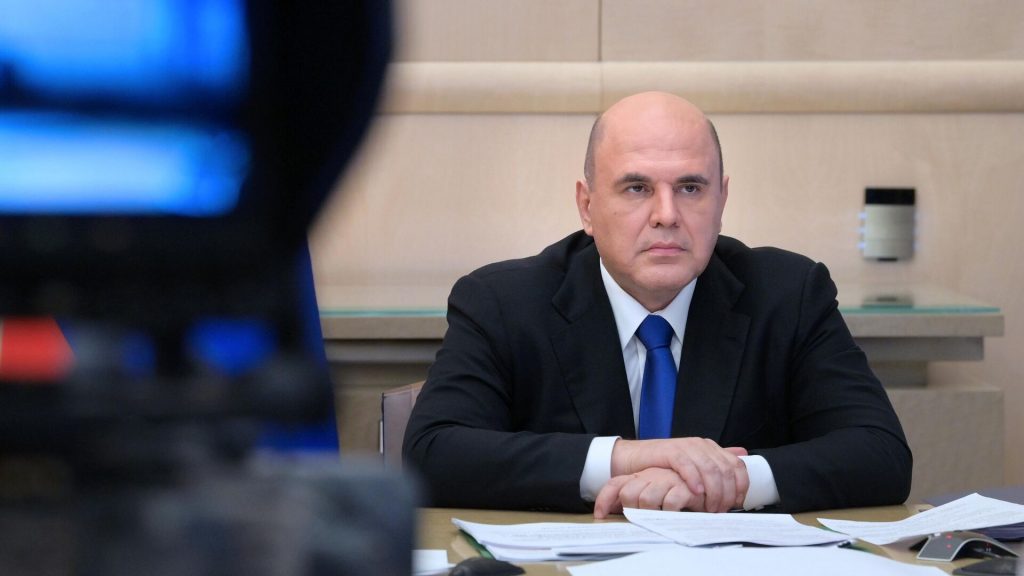
On January 15, 2020, the Government of the Russian Federation in its entirety resigned in connection with the reforms proposed by Vladimir Putin. On the same day, Putin submitted Mishustin’s candidacy for the post of the new prime minister; on January 16, it was approved by the deputies of the State Duma. In the three years since that time, the Mishustin government has faced the COVID-19 pandemic, Russia’s invasion of Ukraine, the imposition of nine packages of Western economic sanctions, and Putin’s attempt at a geopolitical pivot toward Asia and the Middle East.
Outcomes and outlook:
It is worth recognising that Mikhail Mishustin turned out to be a rather successful head of the government. A technocrat who is absolutely far from politics and political intrigues, a successful reformer (first of all, attention should be focused on his implementation of the tax reform) fits perfectly into the system of power in Russia, where “grey horses” should work, and the president should receive laurels and glory. Moreover, Mishustin certainly does not harbour presidential plans and ambitions and therefore is not dangerous from the point of view of Putin and the oligarchs closest to him. Among Mishustin’s natural enemies, only Dmitry Medvedev, who cannot accept the resignation from the premier post in 2020, and Moscow Mayor Sergei Sobyanin, who dreams of sitting in the chair of the head of government, have remained.
The Mishustin government (it is more correct to speak of the Mishustin-Belousov government since First Deputy Prime Minister Andrey Belousov plays a paramount role in creating leverage of financial influence on processes in the economy) has undergone a minimum of replacements and upheavals in three years – only seven replacements of ministers, of which three were caused by internal considerations (the movement of figures within the government).
It is worth paying tribute to Mishustin: he managed to keep the ruble under challenging conditions (albeit with the use of artificial mechanisms that have little to do with a market economy) and also minimise the consequences of the imposition of sanctions.
Recently, people in Russia are beginning to say that Mishustin is suitable for peacetime. In a war, a prime minister who can transfer the country’s economy to a military footing will be needed. It is quite possible that this factor may lead Vladimir Putin to decide to replace the efficient economist Mishustin with a specific person with the image of a “tough manager” capable of reorienting the economy in the right direction and making it work for the upcoming presidential elections. Mishustin is too rational to perform two tasks at the same time.
5. Press conference of the Minister of Foreign Affairs of the Russian Federation Sergey Lavrov
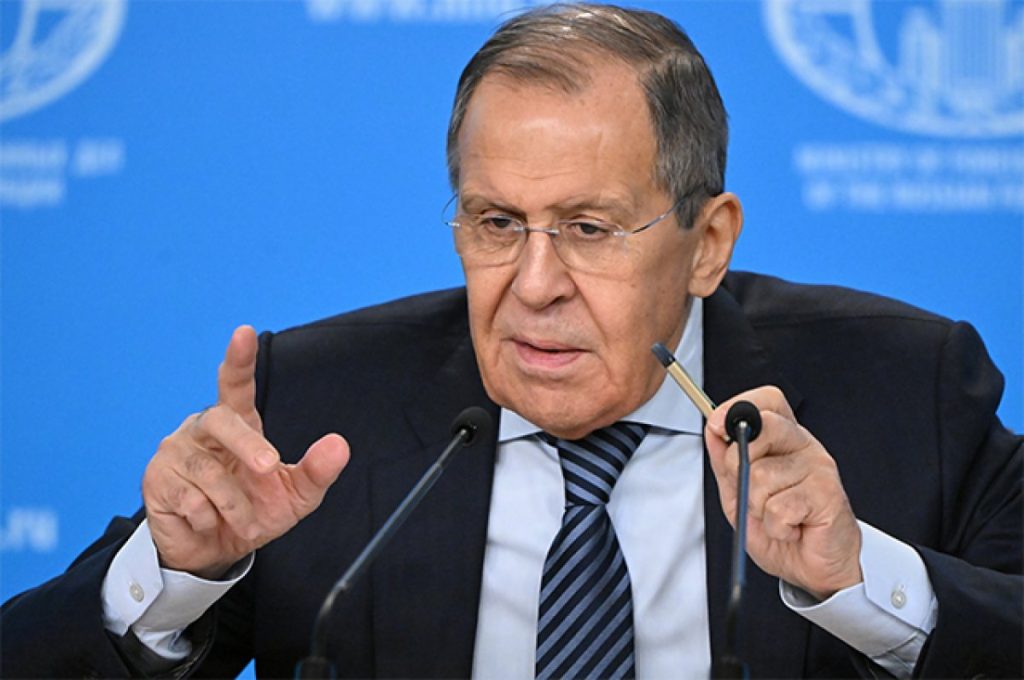
On Wednesday, January 18, Russian Foreign Minister Sergei Lavrov held a traditional press conference. During it, he summed up the work of Russian diplomacy in 2022 and also answered questions from journalists. Despite the event duration (3 hours and 2 minutes) and the number of journalists present at the press conference (178), Lavrov managed to answer 18 questions. In the end, when Maria Zakharova stated that there was time left for the last two questions, Lavrov offered to give them to journalists from “unfriendly countries”, who had to decide for themselves who they were (many of those present, including representatives of Japan and the United States, did not refuse such a title).
Lavrov’s key theses:
- “The crisis in the world was brewing long before the start of the [so-called] special military operation of Russia.”
- “Sanctions contrary to Western postulates are used against Russia, but could soon be used against any state that refuses to follow American orders.”
- “The deliberately confrontational agenda of the EU and NATO in the declaration was proclaimed to the whole world; it directly puts the Europeans in subjection to the North Atlantic Alliance in the matter of geopolitical containment of Russia and China.”
- “Instead of seeking consensus, military blocs are being created, such as AUKUS, within which Japan is on the path of militarisation.”
- “In the framework of our contacts with the SCO, CIS, BRICS, associations of Asia, Africa, and Latin America, we are trying to build such forms of interaction that will benefit us and that those who want to rule the world will not be able to influence.”
- “The [so-called] SMO has goals that were not invented but are determined by the fundamental security interests of the Russian Federation. In Ukraine, as in any territory bordering Russia, no military infrastructure should threaten our country. And there should be no discrimination or persecution against our compatriots who turned out to be citizens of the Ukrainian state but want to preserve their language, culture, and the opportunity to educate in this culture of their children, as stated in the Constitution of Ukraine.
- “As for the prospects for negotiations, this has been discussed dozens of times. When we supported Ukraine’s request for negotiations, the draft settlement proposed by Ukraine, we shook hands. All summer and early autumn, Western representatives said that it was too early to move on to negotiations more weapons should be given; Zelensky puts forward absurd initiatives, where everything that is possible is heaped: repentance of Russia, a tribunal, condemnation. Negotiations with Zelensky are out of the question because he banned negotiations with Russia at the legislative level.”
- “The United States destroyed Iraq and Libya; in Yugoslavia, they decided to destroy the Balkans, including to please Germany, which recognised Croatia and Slovenia, cutting off the possibility of creating a different format between the Balkan countries.”
- “No one thought of any tribunals when the US invaded Syria and began to level Syrian cities like Raqqa. When the International Criminal Court decided to look into US crimes in Afghanistan, the US threatened the supreme judiciary with sanctions.”
- “The Arabs are our old and true friends. I see an understanding of our position, an understanding that this is not about Ukraine but the struggle for a new world order between those who believe that the world should be subordinated to them and those who want a democratic world order.
- “One of the main problems in Syria is Idlib, where there should be no terrorists; this is the northeast, where relations between the authorities and the Kurds need to be improved. We understand our Turkish partners’ annoyance that the US wants to use the Kurds to create a quasi-state.”
- “[On Russia’s relations with the West] The way it used to be will no longer be. We have already said this for a long time: there will be no more situations when you lie to us, sign documents, and refuse to comply with them, as was the case with the OSCE declaration in Astana, the Russia-NATO Council, agreements on regulating the situation in Ukraine signed by Germany, France and Poland, Minsk agreements – all this time they lied to our face.
- “Our relations with China are experiencing the best times in the history of relations.”
- “The West’s Indo-Pacific strategies to drive wedges between India and China are obvious enough. But, the creation of AUJUS with the humiliation of France along the way, the course towards expanding the bloc format, including with Japan, New Zealand, and Korea, comes at the expense of undermining those structures that have shaped the security architecture in Asia for decades.”
- “Everyone calls for negotiations, and then some Jake Sullivan will say that now is not the time for negotiations; more weapons are needed to strengthen the position of Ukraine.”
- “Relations between Russia and Latin America are on the rise.”
- Lavrov recalled that Japan, Germany and Italy, for the first time, voted against the Russian resolution to ban the glorification of Nazism.
Outcomes and outlook:
As expected, Lavrov’s final press conference served as a platform for repeating the main theses that were regularly heard throughout 2022. But, in fact, the statements of the head of the Russian Foreign Ministry are a refined position of Russia, without Putin’s veiled reflections, Medvedev’s fatalistic threats and Kadyrov-Prigozhin’s revolutionary slogans.
Lavrov once again tried to outline the principled positions of Russia, according to which the whole world should reckon with it. All the Russian army’s actions aim only at protecting the Russian-speaking population of specific countries and Russian interests.
Lavrov devoted a significant part of the press conference to the designation of Russia’s new allies, on relations with which Russia’s foreign policy will be built. First, we are talking about Asia, the Middle East, Latin America and Africa. At the same time, once again, the thesis was voiced that relations with the West would never be the same.
It is worth paying particular attention to Lavrov’s statement on relations with the Arab world and their position on sanctions. Undoubtedly, maintaining friendly relations with the Middle Eastern states, Russia remains one of the most important factors in the confrontation with the West. At the end of 2022, it can be stated that such relations can be maintained at the proper level. At the same time, one should not forget about the number of interests of individual states in this region and the presence of a number of local conflicts that can radically change the situation.
It is essential to note Lavrov’s statement about China. According to the head of the Russian Foreign Ministry, relations between the two states are experiencing the best times in the entire history of diplomatic contacts. Undoubtedly, this factor is the main threat to the Western world, which will have to be reckoned with shortly. The most revealing should be Xi Jinping’s visit to Moscow, which could occur as early as the spring of 2023.
6. Vladimir Putin visits Saint-Petersburg
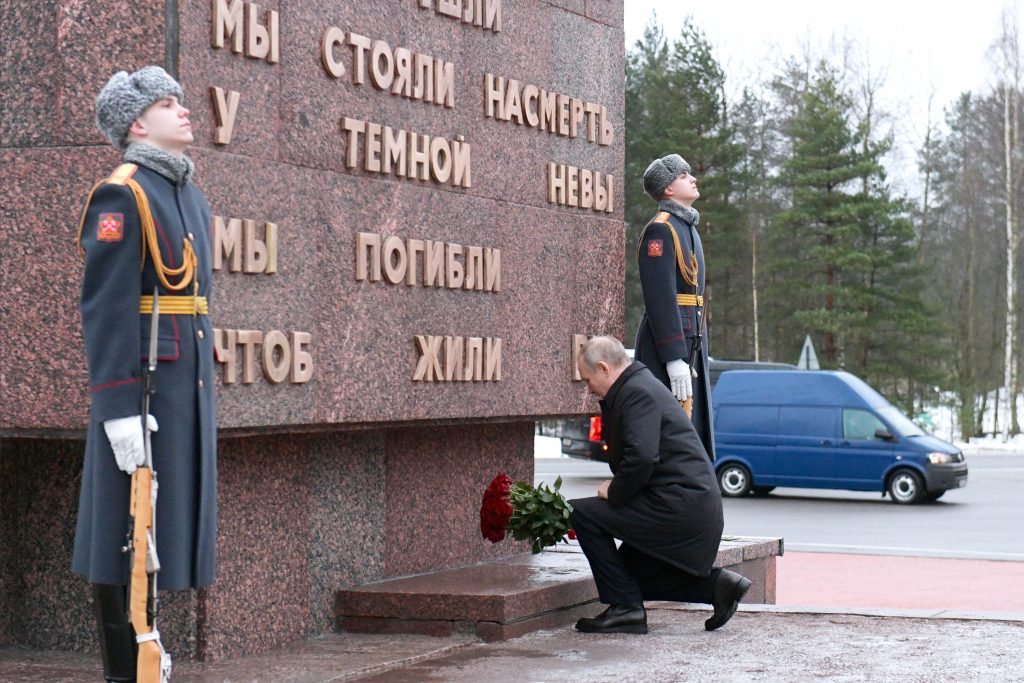
On Wednesday, January 18, Vladimir Putin visited St. Petersburg. He took part in events marking the 80th anniversary of breaking the siege of Leningrad and met with St. Petersburg Governor Alexander Beglov. In addition, he met with veterans of the Great Patriotic War (WWII), residents of besieged Leningrad, and representatives of patriotic associations and visited the Obukhov plant, a part of the Almaz-Antey aerospace defence concern.
Timeline of events and statements:
- At the Piskaryovskoye Memorial Cemetery, where one of the mass graves of victims of the blockade of Leningrad and soldiers of the Leningrad Front is located, Putin laid flowers at the Motherland monument. Putin also visited the Rubezhsky Stone monument, a bridgehead where his father fought and was wounded.
- Putin held a working meeting with the governor of St. Petersburg, Alexander Beglov, during which he thanked the governor for the “good, stable position of St. Petersburg.” Social issues, payments to the participants of the so-called “SMO”, and regional infrastructure projects were also discussed.
- Putin held a meeting with WWII veterans at the State Memorial Museum of the Defense and Siege of Leningrad.
- Putin: “First, I want to address the veterans. I want to congratulate you on a significant event: the 80th anniversary of breaking the siege of Leningrad. This is a great event for us, not only for the defenders and residents of besieged Leningrad but for the whole country.”
- Putin also said that the issue of recognising the genocide against the civilian population of the USSR during the Great Patriotic War is essential. According to him, the Nuremberg trials considered this issue “in general terms”, but it was impossible to present all the facts testifying to the genocide.
- During a tour of the Memorial Museum of the Defense and Siege of Leningrad, looking at a display case with grocery cards, Putin recalled a story that happened to his mother during the blockade: “My mother’s cards were stolen once. She came up to get bread, and someone hit her hand, grabbed it and ran away. Well, that’s all.”
- Putin: “The threat of Nazism is not a distant past. There have always been attempts to revive it in the West.”
- Putin visited the Obukhov plant, part of the Almaz-Antey aerospace defence concern, where he spoke with the enterprise workers. The President of the Russian Federation also inspected the test building and the plant’s workshops and got acquainted with military and civilian product samples.
Outcomes and outlook:
For Putin, the blockade of Leningrad (during which the elder brothers of the President of the Russian Federation died) is one of the most important topics. However, an exceptional situation has escalated this year around the trip to St. Petersburg. The day before the trip, the media announced the possibility of some important statement by Putin on the Ukrainian issue. Some experts have suggested that Putin will announce a new wave of mobilisation or declare war on Ukraine. It was also predicted that the governor of St. Petersburg, Alexander Beglov, who came into conflict with the founder of PMC Wagner Yevgeny Prigozhin, would be dismissed. Even though the press secretary of the President of the Russian Federation, Dmitry Peskov, denied such speculation, the intrigue remained.
There were no particular statements regarding Ukraine. Putin once again declared that the Nazi regime was in power in Ukraine, which the United States of America supports. He again stressed that “all the goals of the [so-called] special military operation will be achieved.”
Beglov’s resignation also did not take place. Moreover, Putin seems to have reconciled Beglov and Prigozhin since Prigozhin announced immediately after Putin visited St. Petersburg that he was ending the fight against Beglov. Thus, the Russian elites have eliminated an important knot of contradictions.
7. Sergey Lavrov’s visit to Minsk
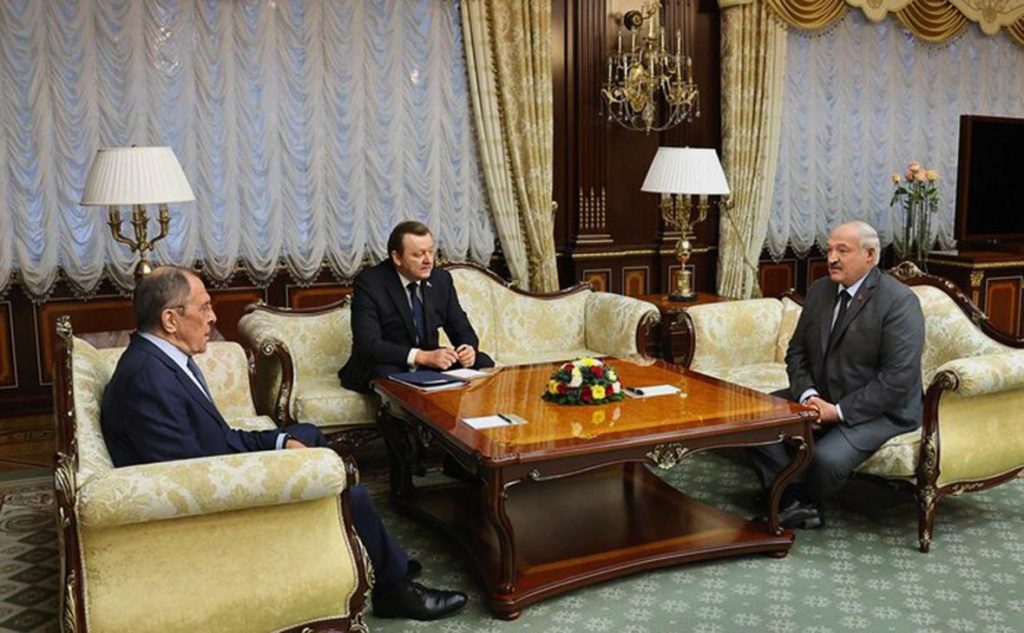
On Wednesday, January 18, after a three-hour press conference in Moscow, Russian Foreign Minister Sergei Lavrov arrived in Minsk for the traditional joint meeting of the Foreign Ministries of Belarus and Russia. During the working visit, Lavrov met with Alexander Lukashenko and Belarusian Foreign Minister Sergey Aleinik. According to official statements, during the visit, they discussed cooperation on multilateral platforms in the field of arms control, as well as opposition to the West’s line on the politicisation of international organisations.
Key theses:
- Lukashenko: “We have finished the year. In the know and very familiar with the year’s results in Russia. Approximately the same results of the year and we have. It is excellent that we have entered the trade balance in business and economic relations with the Russian Federation. Even a little higher: the balance is in favour of Belarus. This suggests that those attempts to strangle us, both Russia and Belarus, have actually failed today. We will definitely survive.”
- “If we [between the Russian Federation and the Republic of Belarus] had all departments cooperating in the same way as the Ministry of Foreign Affairs, we would not have any problems at all. And there would be no issues. I’ve always said it. Not only today.”
- Lukashenko: “We have questions that we need to discuss with you. You know my attitude towards you. I never hide anything from you. It is very important. Well, to consult on some matters. Therefore, I propose to discuss the main issues, and then we will talk tête-à-tête, as they say, on some topical issues. This is not because we are hiding something from Sergey [Aleinik]. Absolutely not. But there are questions beyond our official events today.”
- Lavrov: “…we calculated that you personally met [Putin] 10 times last year, in addition to telephone contacts. Therefore, at the level of heads of foreign affairs departments, we cannot keep up with you. But that’s the way it should be.”
- Lukashenko: “Today, security for us, not only for Russia, is even more important. You know the intentions of our Western neighbours. Not only Ukraine. They are trying to use Ukraine against Belarus as well. But what amazes me and pleasantly surprises me is that Ukraine is still holding out. She does not go for provocations against Belarus. Although our western neighbours are actively pushing it. You also know who.”
- Lavrov: “The agreements that the two presidents [Putin and Lukashenko] reach in the sphere of our military-technical, military, defence cooperation are very, very timely in terms of readiness for any development of events.”
- After meeting with the Belarusian leader, Lavrov took part in a meeting of the boards of the two countries’ foreign ministries (the next one will be held in Moscow in the fourth quarter). The Belarusian side at the meeting was headed by the new Minister of Foreign Affairs, Sergey Aleinik, who took office on December 13, 2022.
- During the meeting of the collegiums of the Russian Foreign Ministry and the Republic of Belarus, several issues were discussed regarding the further development of diplomatic relations, the development of joint positions in cooperation with international organizations, and resistance to pressure from the West (apparently, we are talking about sanctions). The parties also focused on the exceptional importance of arms control in the current conditions.
Outcomes and outlook:
This visit can be described as a visit of Lavrov’s acquaintance with the new head of the Belarusian Foreign Ministry and coordination of the positions of Russia and Belarus on important joint issues of international cooperation. Moscow does not particularly trust Aleinik, remembering that he worked for a long time in the Vatican and the UK.
Here it is essential to pay attention to Lukashenko’s statement regarding several issues that will be discussed with Sergey Lavrov together, without Aleinik’s participation.
Russian experts stress that Aleinik may come as more of a surprise to the Kremlin than his late predecessor, Vladimir Makey. Aleinik is less public but “on his mind.” And in the conditions of the political game of Alexander Lukashenko, Aleinik can present many unexpected surprises to Lavrov and the entire diplomatic machine of the Russian Federation.
That is why Lavrov’s mission was aimed at reminding Belarus of common enemies, the need to “stick together” in a difficult situation, and Belarus’ obligations within the Union State.

